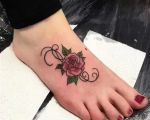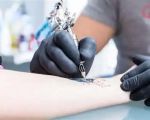The Dos and Don’ts of Tattoo Aftercare
- 1. Understanding the Tattoo Healing Process
- 2. Essential Dos for Tattoo Aftercare
- 3. Common Don’ts to Avoid During Tattoo Aftercare
- 4. How to Handle Itching and Peeling
- 5. When to See a Doctor for Complications
- 6. Inked Up Dolls Recommendations for Aftercare Products
1. Understanding the Tattoo Healing Process
Getting a tattoo is a significant investment in self-expression, but it’s important to remember that your body needs proper care after the tattooing process. The healing process is crucial for ensuring that the ink settles well and your skin remains healthy. Understanding how your tattoo heals can help you avoid complications and ensure the best results.
After getting a tattoo, your body starts the healing process, which typically lasts anywhere from two to four weeks, depending on the size and location of the tattoo. During this time, your skin will go through stages of healing, from the initial formation of scabs to peeling and itching, followed by the complete settling of the ink. By caring for your tattoo properly, you help prevent infections, fading, and other issues that can affect the final look of your tattoo.
The key to successful tattoo aftercare lies in keeping your tattoo clean, moisturized, and free from irritants. The right aftercare routine will promote faster healing and ensure your tattoo looks vibrant for years to come.
2. Essential Dos for Tattoo Aftercare
To ensure your tattoo heals properly, there are several important things to do in the days and weeks following your tattoo appointment. By following these dos, you’ll support the healing process and avoid common mistakes that could harm your tattoo.
- Keep it Clean: Gently wash your tattoo with mild, unscented soap and lukewarm water. Avoid scrubbing or using abrasive materials, as your tattooed skin is sensitive and can become irritated.
- Moisturize Regularly: Apply a thin layer of tattoo aftercare ointment or fragrance-free moisturizer to keep the skin hydrated. Be sure not to over-apply, as this can clog the pores and slow down the healing process.
- Wear Loose Clothing: Avoid tight clothing that may rub against the tattooed area, as this can cause irritation or friction. Loose clothing allows the skin to breathe and heal faster.
- Protect It from the Sun: Your tattoo is vulnerable to sun damage during the healing process. Protect your tattoo from direct sunlight, as UV rays can cause the ink to fade and may irritate your skin.
- Allow it to Breathe: Avoid wrapping your tattoo in plastic for prolonged periods. Letting the tattoo breathe is essential for proper healing, so keep it exposed to air as much as possible.
By following these essential dos, you’ll ensure that your tattoo heals properly and stays vibrant for a long time. Consistency and patience are key in the healing process, so make sure you stick to a regular aftercare routine during this time.
3. Common Don’ts to Avoid During Tattoo Aftercare
While it’s important to know what to do during tattoo aftercare, it’s equally crucial to understand what to avoid. Many common mistakes can damage your tattoo or slow down the healing process. Here are the top don’ts to keep in mind:
- Don’t Scratch or Pick: It’s natural for tattoos to itch or peel as they heal, but scratching or picking at the scabs can cause infection, scarring, or ink loss. Let the peeling happen naturally.
- Avoid Hot Tubs and Pools: While you may be tempted to take a dip in a hot tub or pool, doing so can expose your tattoo to bacteria, which increases the risk of infection. Avoid submerging your tattoo in water for at least a few weeks after getting it.
- Don’t Apply Excessive Pressure: Avoid pressing or rubbing the tattoo too hard. This can disrupt the healing process and cause the tattoo to heal unevenly or become irritated.
- Don’t Expose It to Dirty Surfaces: Your tattooed skin is sensitive and can be easily infected. Avoid placing your tattoo on dirty or unclean surfaces that could transfer bacteria to the area.
- Don’t Wear Tight or Restrictive Clothing: Tight clothing can rub against the tattoo, causing irritation or even pulling the scab off prematurely. Stick to loose, comfortable clothing that doesn’t obstruct airflow to the tattoo.
Avoiding these common mistakes will help your tattoo heal properly and preserve the vibrant colors and sharp details of the design. It’s essential to be patient and gentle with your tattoo to ensure the best outcome.
4. How to Handle Itching and Peeling
Itching and peeling are common parts of the tattoo healing process. As your skin heals, it can feel uncomfortable, but it’s important not to scratch or pick at the tattoo. Instead, follow these steps to handle itching and peeling properly:
- Apply Moisturizer: Moisturizing your tattoo regularly helps soothe itching and keep the skin hydrated. Use a thin layer of fragrance-free lotion or tattoo-specific ointment to reduce discomfort.
- Gently Pat, Don’t Scratch: If your tattoo itches, resist the urge to scratch. Instead, gently tap or pat the area to relieve the itch. Scratching can lead to scarring or disrupt the healing process.
- Allow Peeling to Happen Naturally: The skin around your tattoo will naturally peel off as it heals. This is completely normal and should not be rushed. Avoid pulling or picking at the peeling skin, as this can cause scarring or loss of ink.
Handling itching and peeling with patience and care will ensure that your tattoo heals without complications. This stage can be uncomfortable, but remember that the results will be worth it!
5. When to See a Doctor for Complications
While most tattoos heal without issues, there are a few signs that may indicate a problem. If you experience any of the following symptoms, it’s important to consult a doctor:
- Excessive Redness or Swelling: Some redness and swelling are normal during the healing process, but if these symptoms persist or worsen, it could be a sign of infection.
- Pus or Fluid Discharge: If your tattoo is oozing yellow or greenish pus, it may be infected. Seek medical attention immediately to prevent further complications.
- Fever: A fever can be a sign of a systemic infection. If you develop a fever after getting your tattoo, it’s important to see a healthcare professional right away.
If you’re ever unsure about the healing process, it’s always better to seek professional advice. Timely intervention can help prevent long-term complications and ensure your tattoo heals as it should.
6. Inked Up Dolls Recommendations for Aftercare Products
If you’re looking for high-quality tattoo aftercare products, visit Inked Up Dolls for the best selection. We offer premium aftercare creams, lotions, and balms that help your tattoo heal faster and maintain its vibrancy. From soothing ointments to protective wraps, we have everything you need to ensure your tattoo heals beautifully.
Choose from a range of carefully selected products designed to nourish your skin and protect your tattooed area. Investing in the right aftercare products is just as important as following the correct aftercare routine to maximize your tattoo’s long-term health and appearance.








